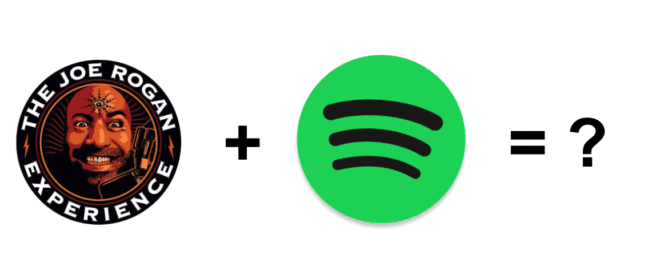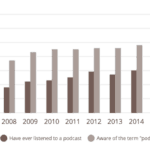The fallout of Joe Rogan joining Spotify

The dust has started to settle on the massive news announced yesterday, The Joe Rogan Experience will — at least for a few years — be an exclusive podcast* on Spotify. The accompanying YouTube channel will no longer release full videos of the interviews, forgoing several million views per episode.
The Details
We don’t have the full details of the licensing deal, but we do know most of the basics. The deal is a multiyear licensing agreement that will bring The Joe Rogan Experience to Spotify starting September 1st and exclusive sometime shortly after that.
Along with the audio podcast, the interviews will be available in video format through Spotify as well.
The crucial details we don’t have confirmation on yet are the financials or years behind the deal. The WSJ reported the deal is worth “more than $100 million”, while a reporter at New York Magazine reported it’s worth $200 million.
The years are the major variable here. If the deal is indeed worth $200 million over two years that’s a lot more lucrative than ten years. In the initial news write-up, I speculated the deal would likely mirror Howard Stern’s first deal with Sirius XM, $500 million over five years. My gut still feels like it’s worth at least $75 million each year with incentives.
Spotify reportedly bought The Ringer for around $250 million, and though this is a licensing deal versus a purchase, I think Rogan moves the needle more.
Related reading: best Joe Rogan podcast episodes
Exclusivity and the “open” podcast ecosystem
*Podcasts are fundamentally an open media. When you start a podcast, your podcast host generates an RSS feed which most podcast streaming services crawl and provide your show in their directory. This allows the same feed to be in Apple Podcasts, Google Podcasts, Stitcher, Overcast, and most other podcast apps.
However, this fundamental openness is challenged by exclusivity and walled gardens. Whether it’s Spotify, Luminary, Stitcher Premium, or other services that require a subscription, the audio shows on these services are no longer open. Which begs the question, are they still podcasts?
Ben Thompson writes often about aggregation and business models and as Spotify entered the podcast space he’s been warning of their moves to destroy the open model of podcasts. In his daily briefing this morning, he writes,
“Spotify doesn’t just want to capture new listeners, it wants to actively take them from Apple and other podcast players. And, if it can take a sufficient number, the company surely believes it can create a superior monetization mechanism such that the rest of the podcast creator market shifts to Spotify out of self interest.”
The echoing I’ve seen on Twitter from indie podcasters has been generally “this is bad for podcasting.” I’m not willing to go that far, but it’s piqued my interest to pay more attention to the shockwaves from this deal.
On one hand, exclusive content — whether it’s music, podcasts, video games, TV shows, etc. — is usually never good for the end consumer. You don’t want to have to subscribe and change apps to consume your favorite content.
On the other hand, this is an inevitable growing pain of the industry. Exclusive walled gardens within podcasts have been attempted several times in the past, with limited success. The money Spotify is willing to invest shows their intent to dominate the market. That said, more money invested in the industry should be thought of as a good thing. The more resources funneling into the industry the more mature, sustainable, and ultimately beneficial it will be for those working in the space. These benefits will ultimately trickle down to listeners as the number, quality, and ubiquitous of podcasts increases.
The impact on Spotify
“Big boy version of what Luminary was trying to do” – Zach Mack, Recode Media
When the news was announced, Spotify’s stock shot up about 10%. The market thinks it’s an overall good thing for the company even if the financial details weren’t disclosed.
Why? The potential user acquisition growth is obvious.
- Spotify: 286 million monthly active users
- The Joe Rogan Experience: 190 million monthly downloads
These aren’t mutually exclusive numbers, but we can estimate 50% of Rogan listeners aren’t active on Spotify. Out of that 50%, let’s say 75% are loyal and will listen to the podcast on Spotify. That’s over 71 million new monthly users for Spotify, an influx growth of about 25% for Spotify.
Podcasts are uniquely beneficial for Spotify since they are fixed and scalable costs. If a song on Spotify is streamed 100 times they owe royalties on each stream. As that song’s popularity grows, so do the costs for Spotify. For a podcast, the cost is generally the same whether it’s downloaded 100 times or 100 million.
What podcasts are left to gobble up?
The Joe Rogan move will likely reignite the “podcast wars” takes. Which podcasts or networks are available to either acquire or partner with exclusive rights that would move the needle?
Here are my picks in order of likelihood:
- Wondery
- Crooked Media
- Pushkin Industries
- WTF with Marc Maron
- Barstool Sports
- Armchair Expert with Dax Shepard
- This American Life
- Night Vale Presents
- Headgum
- Conan O’Brien Needs a Friend
- NPR
- New York Times













Comments
Comments are closed.